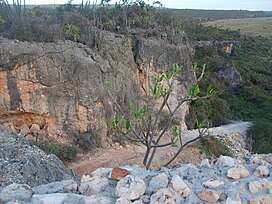Hispaniolan dry forests
| Hispaniolan dry forests | |
|---|---|
 Jaragua National Park, Dominican Republic | |
 Ecoregion territory (in purple) | |
| Ecology | |
| Realm | Neotropical |
| Biome | tropical and subtropical dry broadleaf forests |
| Borders | Greater Antilles mangroves, Hispaniolan moist forests, and Hispaniolan pine forests |
| Geography | |
| Area | 15,123 km2 (5,839 sq mi) |
| Countries | |
| Conservation | |
| Conservation status | Critical/endangered[1] |
| Protected | 2,859 km2 (19%)[2] |
The Hispaniolan dry forests are a tropical dry broadleaf forest ecoregion on the island of Hispaniola (split between the Dominican Republic and Haiti). They cover 15,123 km2 (5,839 sq mi), around 20% of the island's area.[1]
Geography[]
The dry forests are found mostly on the southern and western portions of the island of Hispaniola, covering portions of both the Dominican Republic and Haiti. The ecoregion covers the southern and western coastal lowlands, the Cul-de-Sac–Enriquillo lowland, and the Cibao Valley in the north-central portion of the island.[1]
Flora[]
Plant communities include high dry forest and cactus scrub dominated by species of Prosopis, Lemaireocereus, Pilosocereus, Cylindropuntia, Agave, and Bursera.[3]
Protected areas[]
2,859 km2, or 19%, of the ecoregion is in protected areas.[2] Protected areas include Jaragua National Park (1535.5 km2), Sierra de Bahoruco National Park (1091.8 km2), (23.9 km2), (192.2 km2), (5.9 km2), (29.2 km2), Carretera Cabral - Polo panoramic road (12 km2), and Carretera Santiago - La Cumbre - Puerto Plata panoramic road (21 km2).[4]
References[]
- ^ a b c "Hispaniolan dry forests". Terrestrial Ecoregions. World Wildlife Fund.
- ^ a b Eric Dinerstein, David Olson, et al. (2017). An Ecoregion-Based Approach to Protecting Half the Terrestrial Realm, BioScience, Volume 67, Issue 6, June 2017, pp. 534–545; Supplemental material 2 table S1b. [1]
- ^ Cano-Ortiz, Ana & Musarella, Carmelo & Piñar Fuentes, José Carlos & Gomes, Carlos & Cano, Eusébio. (2015). Forests and Landscapes of Dominican Republic. Jordan Journal of Applied Science.
- ^ "Hispaniolan dry forests". DOPA Explorer. 15 December 2020. Retrieved 16 December 2020.
External links[]
- "Hispaniolan dry forests". Terrestrial Ecoregions. World Wildlife Fund.
- Hispaniolan dry forests (DOPA)
- Hispaniolan dry forests (Encyclopedia of Earth)
- Neotropical dry broadleaf forests
- Ecoregions of the Caribbean
- Ecoregions of the Dominican Republic
- Ecoregions of Haiti
- Geography of Hispaniola
- Flora of Hispaniola